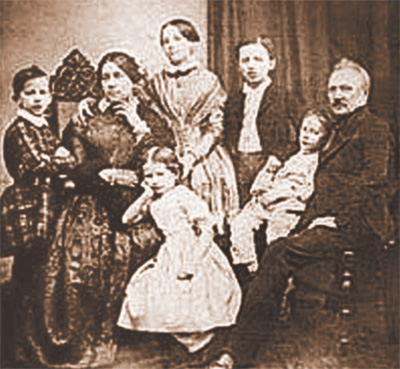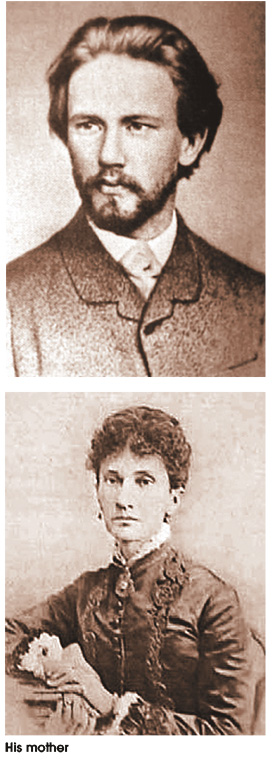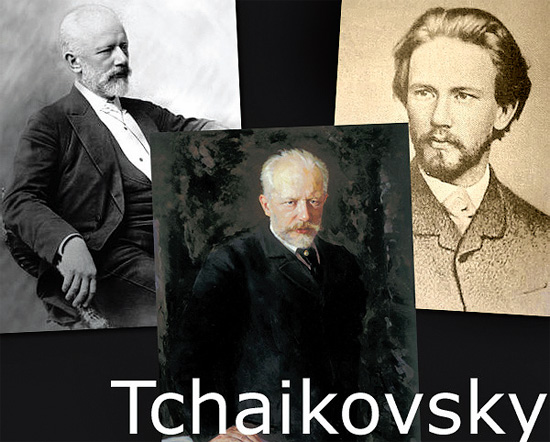Tchaikovsky-the musical genius
Pyotr Il'yich Tchaikovsky was the author of some of the most popular
themes in all of classical music. He founded no school, struck out no
new paths or compositional methods, and sought few innovations in his
works.
 Yet the power and communicative sweep of his best music elevates it
to classic status, even if it lacks the formal boldness and harmonic
sophistication heard in the compositions of his contemporaries, Wagner
and Bruckner. Yet the power and communicative sweep of his best music elevates it
to classic status, even if it lacks the formal boldness and harmonic
sophistication heard in the compositions of his contemporaries, Wagner
and Bruckner.
It was Tchaikovsky's unique melodic charm that could, whether in his
Piano Concerto No. 1 or in his ballet The Nutcracker or in his tragic
last symphony, make the music sound familiar on first hearing.
Tchaikovsky was born into a family of five brothers and one sister.
He began taking piano lessons at age four and showed remarkable talent,
eventually surpassing his own teacher's abilities. By age nine, he
exhibited severe nervous problems, not least because of his overly
sensitive nature. The following year, he was sent to St. Petersburg to
study at the School of Jurisprudence.
The loss of his mother in 1854 dealt a crushing blow to the young
Tchaikovsky. In 1859, he took a position in the Ministry of Justice, but
longed for a career in music, attending concerts and operas at every
opportunity. He finally began to study in harmony with Zaremba in 1861,
and enrolled at St. Petersburg Conservatory the following year,
eventually studying composition with Anton Rubinstein.

In 1866, the composer relocated to Moscow, accepting a professorship
of harmony at the new conservatory, and shortly afterward turned out his
First Symphony, suffering, however, a nervous breakdown during its
composition. His opera The Voyevoda came in 1867-1868 and he began
another, The Oprichnik, in 1870, completing it two years later.
Other works were appearing during this time, as well, including the
First String Quartet (1871), the Second Symphony (1873), and the ballet
Swan Lake (1875).
In 1876, Tchaikovsky travelled to Paris with his brother, Modest, and
then visited Bayreuth, where he met Liszt, but was snubbed by Wagner. By
1877, Tchaikovsky was an established composer. This was the year of Swan
Lake's premiere and the time he began work on the Fourth Symphony
(1877-1878).
It was also a time of woe: in July, Tchaikovsky, despite his
homosexuality, foolishly married Antonina Ivanovna Milyukova, an
obsessed admirer, their disastrous union lasting just months. The
composer attempted suicide in the midst of this episode.
Near the end of that year, Nadezhda von Meck, a woman he would never
meet, became his patron and frequent correspondent.
Further excursions abroad came in the 1880s, along with a spate of
successful compositions, including the Serenade for Strings (1881), 1812
Overture (1882), and the Fifth Symphony (1888).
In both 1888 and 1889, Tchaikovsky went on successful European tours
as a conductor, meeting Brahms, Grieg, Dvorák, Gounod, and other notable
musical figures. Sleeping Beauty was premiered in 1890, and The
Nutcracker in 1892, with success.
Throughout Tchaikovsky's last years, he was continually plagued by
anxiety and depression. A trip to Paris and the United States followed
one dark nervous episode in 1891. Tchaikovsky wrote his Sixth Symphony,
"Pathétique," in 1893, and it was successfully premiered in October,
that year. The composer died ten days later of cholera, or -- as some
now contend -- from drinking poison in accordance with a death sentence
conferred on him by his classmates from the School of Jurisprudence, who
were fearful of shame on the institution owing to an alleged homosexual
episode involving Tchaikovsky.
About Classical Music Classical music is probably more familiar than
we might at first imagine. Indeed, nowadays it is all around us, whether
it be in restaurants, supermarkets, lifts, for advertising or as theme
and incidental music on television. A great deal of film music either
directly uses or draws from the 'classical' tradition; a good example of
the former might be '2001: Space Odyssey', and of the latter, the many
scores John Williams has composed in recent years for such blockbusters
as the Star Wars and Indiana Jones trilogies.
In the vast and wide-ranging world of 'classical' music there is
truly something there for everyone - pieces which once discovered
represent the start of an exciting and irresistible journey which will
provide a lifetime's listening pleasure. For example, those who are
particularly excited by hearing instrumentalists working at full stretch
will thrill to the likes of Liszt and Paganini, or if something a little
more reserved and self-contained is required, the chamber music of Haydn
or Mozart would be a good starting point.
If a full symphony orchestra in overdrive is more to your taste then
Tchaikovsky or Richard Strauss could well fit the bill, whereas those
who have already warmed to Vivaldi's 'Four Seasons' might well try the
music of some of the great Italian's contemporaries such as Handel,
Johann Sebastian Bach or Domenico Scarlatti. Whatever your tastes may
be, there has never been a better time to start building a 'classical'
music collection on CD.
Any attempt to define what is meant literally by the term 'classical'
music is fraught with difficulty. How does one encapsulate in just a few
words a musical tradition which encompasses such infinite varieties of
style and expression, from the monastic intonings of Gregorian chant to
the laid-back jazz inflections of Gershwin's Rhapsody in Blue, from the
elegant poise of Mozart's Eine kleine Nachtmusik to the despairing,
heightened emotionalism of Tchaikovsky's "Pathetique" Symphony?
 One is treading on very dangerous ground indeed if one pre-supposes
that it is simply 'superior' to other musical types such as popular,
jazz, rock and the like, let alone the music of other cultures. One is treading on very dangerous ground indeed if one pre-supposes
that it is simply 'superior' to other musical types such as popular,
jazz, rock and the like, let alone the music of other cultures.
In general 'popular' music may be as clear in expression as the
longer examples of 'classical' music. One important difference, however,
lies in the logical connection that exists in 'classical ' music between
the beginning and end, with the latter a logical extension and
development of the former. 'Popular' music, on the other hand, tends to
present its material without development, the music ending when interest
is exhausted.
Sadly, whilst 'classical' music is socially undivisive in itself, it
has unfortunately become associated in most people's minds with the
intellectual elite. Even now, and with certain honourable exceptions,
the attending of a 'live' concert can be an intimidating (not to say
costly) experience for the uninitiated, especially in that most
jealously guarded of establishments, the opera house. The wonderful
thing about the technological age in which we live, and particularly the
advent of the compact disc, is that we can bypass all irrelevant social
and intellectual pretence, and enjoy in the comfort of our own home
(often at far less cost) some of the finest music ever composed.
With such a breathtaking variety of material available, it is an
awesome task to know just where to begin your disc collection, and as a
result expensive mistakes are often made as tempting looking purchases
turn out to be something of a disappointment. This is where the Naxos
catalogue really comes into its own, and where it is hoped this guide
will help prospective purchasers to make an informed choice about the
kind of music they are likely to enjoy.
The Naxos label provides a library of high quality performances of
music by the great masters in modern digital sound; accompanied by
authoritative and user-friendly booklet notes and at the lowest possible
price. There are already nearly 600 titles from which to choose, and
with new releases emerging at the rate of about eight every month, even
the enthusiastic collector is well and truly catered for.
With every historical period and genre covered, there is something in
the Naxos catalogue for everyone, especially those who wish to build a
truly representative collection of the central masterworks in the
'classical' tradition.
-Internet |

